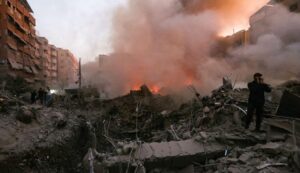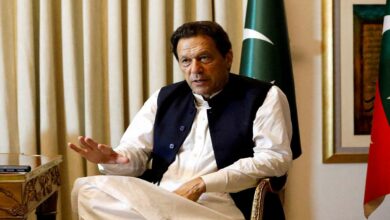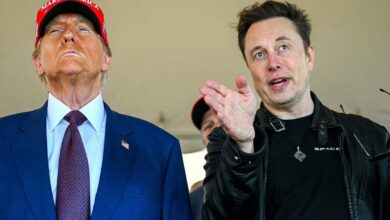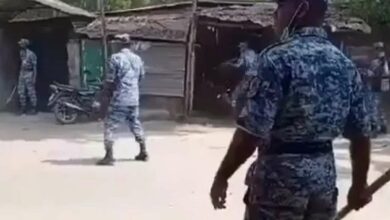Israeli military says it attacked Hezbollah’s central headquarters in Beirut
The largest explosions to strike the Lebanese capital in the previous year occurred in Beirut, where the Israeli military stated on Friday that it had targeted the Hezbollah central headquarters. A series of enormous explosions there destroyed many buildings and sent clouds of orange and black smoke rising in the sky.

According to three prominent Israeli TV networks, the attacks in the southern suburbs of Beirut were intended to kill Hassan Nasrallah, the leader of Hezbollah. The Associated Press was unable to verify the unsourced stories right away, and the army refused to comment. However, there were strong hints that a top commander may have been inside the damaged buildings, considering their size and the time of the explosions.
While Iranian PressTV reported that Hezbollah chairman is safe, Israeli news network Channel 13 said that Nasrallah was inside the headquarters during the attack. PressTV cited a Hezbollah source.
According to Channel 12, an Israeli news channel, Nasrallah was “at least wounded” in the strike.
“There are hints that Nasrallah was present in the targeted facility. Speaking to the American news organization Axios, an Israeli official said, “Those who were there have a very small chance of getting out alive.”
According to a Hezbollah source who spoke with Reuters, Hashem Safieddine, another high-ranking member of the armed organization, is still alive.
After learning of the Israeli airstrike on Hezbollah’s headquarters, Iranian parliament speaker Mohammad Bagher Ghalibaf said that Iran will remain a staunch ally of Hezbollah, “as comrades in battle until the last moment.”
In a video statement posted on X, IDF Spokesperson Rear Admiral Daniel Hagari stated, “Moments ago, the Israel Defense Forces carried out a precise strike on the Central Headquarters of the Hezbollah terror organization…taking the necessary action to protect our people so that Israeli families can live in their homes, safely and securely.”
Prime Minister Benjamin Netanyahu hastily ended a visit to the United States and was heading home rather than waiting for the conclusion of Sabbath on Saturday evening, according to his office, which may be another indication of the severity of the strikes. Hours before, Netanyahu spoke to the UN, reaffirming that Israel will carry out its assault against Hezbollah, so lowering expectations for a cease-fire supported by other countries.
While Netanyahu was briefing accompanying media, word of the explosions broke. The session was abruptly terminated by Netanyahu when a military adviser whispered in his ear.
Israel has been trying to remove Hezbollah’s top leadership this past week to an extent not seen in previous battles. According to the ministry of defense, Yoav Gallant was following up on developments at military headquarters by meeting with the chief of Israel’s air force and other senior commanders.
The primary Hezbollah headquarters, which is situated under residential structures, was the focus of the attacks, according to Israeli army spokesperson Rear Adm. Daniel Hagari. Lebanese official news agency said that six buildings in the Haret Hreik neighborhood of Dahiyeh were reduced to rubble. About thirty kilometers (18 miles) north of Beirut, the bomb rocked buildings and rattled windows. Ambulances with wailing sirens were seen approaching the site.
A Syrian youngster was among the at least ten injured, three of whom were badly injured, according to officials at a local hospital.
The US had no prior notice of the massive attacks on Beirut, the Pentagon stated on Friday.
Israel said it is committed to stop Hezbollah’s shooting into its land, which has lasted for more than 11 months, and it drastically increased its bombings in Lebanon this week. Officials have said that a ground invasion to drive the extremist organization away from the border is a possible, while the exact nature of Israel’s operation is yet unknown. In anticipation, Israel has advanced thousands of soldiers near the border.
According to Health Minister Firass Abiad, at least 25 individuals were killed in Israeli attacks early on Friday, raising the total number of fatalities in Lebanon this week to over 720. Numerous women and children were among the deceased, he said.
Nine members of the same family were killed in a predawn attack that occurred on Friday in the mostly Sunni border town of Chebaa, according to the official news agency. Hussein Zahra, his wife Ratiba, their five children, and two of their grandkids were among the deceased, according to a local.
Netanyahu promised to “continue degrading Hezbollah” at the UN until Israel accomplished its objectives.
The US-backed request for a 21-day ceasefire between Israel and Hezbollah to give diplomatic efforts more time has been dampened by Netanyahu’s remarks. The proposal has received no response from Hezbollah.
backed by Iran The largest military in Lebanon, Hezbollah, said it was launching missiles into Israel as a show of solidarity for the Palestinian people almost immediately after Hamas’ assault on October 7. Tens of thousands of civilians have had to evacuate their houses on both sides of the border as a result of the almost daily exchange of gunfire between it and the Israeli troops since that time.
Given the considerably more limited objectives of the Israeli military, a potential battle with Hezbollah is not expected to endure as long as the ongoing conflict in Gaza, according to an Israeli security officer.
The official, who spoke on the condition of anonymity due to military briefing guidelines, stated that while Israel has pledged to destroy Hamas’ political and military regime in Gaza, the objective in Lebanon is simply to drive Hezbollah away from the Israeli border. This is “not a high bar like Gaza” in terms of operational objectives.
The Israeli military claimed to have launched many attacks on the southern towns of Sidon and Nabatiyeh within the course of two hours on Friday. It claimed to be targeting infrastructure and missile launchers used by Hezbollah. According to the report, Hezbollah launched a barrage of missiles into Tiberias, a city in northern Israel.
Civil defense personnel in Tyre, southern Lebanon, removed the remains of two people from the wreckage of a building that had collapsed due to a strike: 35-year-old Hiba Ataya and her mother, Sabah Olyan. One guy said, “That’s Sabah, these are her clothes, my love,” as her body surfaced.
Israel claims that since this week’s increased strikes began, Hezbollah’s armaments capabilities have already suffered significant harm, and some of the organization’s senior leaders have been killed in the attacks. Authorities claim that despite minimal missile and rocket fire over the previous week, it has regressed.
But the gang had a massive stockpile of rockets and missiles and its residual capacity remain unclear.
Hezbollah leaders and their followers remain defiant. Not long before the blasts Friday evening, hundreds had massed in another area of Beirut’s suburbs for the burial of three Hezbollah members killed in previous attacks, including the chief of the group’s drone unit, Mohammed Surour.
As they marched behind the three coffins covered in the group’s yellow flag, men and women in the enormous throng screamed, “We will never accept humiliation,” and shook their fists in the air.
In a speech, Hezbollah’s senior official in Beirut, Hussein Fadlallah, said that the organization has an infinite supply of skilled soldiers stationed across the front lines, regardless of how many leaders Israel eliminates. Hezbollah will not give up until Israel halts its attack in Gaza, according to a commitment made by Fadlallah.
Fadlallah said, “We will not give up on Palestine, Jerusalem, and the oppressed Gaza.” “In this battle, neutrality has no place.”





